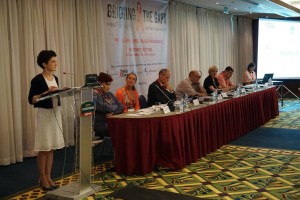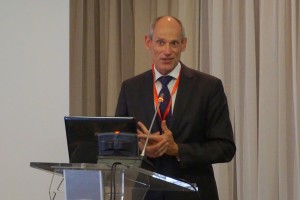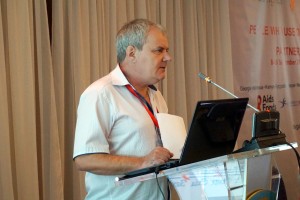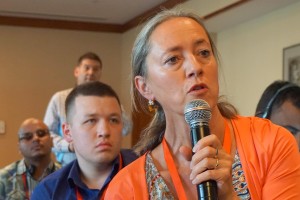On September 8-10 AFEW and Mainline in Tbilisi (Georgia) hosted the 2nd Partner Meeting of non-governmental organisations that implement the People who Use Drugs (PUD) project within the Bridging the Gaps: Health and Rights for Key Populations programme. In addition to sharing experiences, best human rights and advocacy practices, opportunities and challenges in working with and for people who use drugs in 9 countries, the meeting also summarised the results of the Bridging the Gaps programme.

DAY 1 – ADVOCACY AND HUMAN RIGHTS
The meeting kicked off with welcome notes made by the Minister of Justice of Georgia Ms. Tea Tsulukiani, who said that the Georgian government is gradually integrating human rights based policies related to people who use drugs.
“But is this enough? – She asked. – Of course not! It is a painful process but we are making progress. Governments should come and go but good policies should stay,” said Minister Tsulukiani.

With the aim to decrease stigma and discrimination of the law enforcement and health professionals toward people who use drugs, as well as secure the availability of treatment and rehabilitation for people who use drugs, AIDS Foundation East-West together with a number of Georgian civil society organisations amongst which Bemoni and Tanadgoma, the Bridging the Gaps counter parts in Georgia launched the “Addiction is not a Crime!” Through meetings with Georgian political decision-makers, organising mass media campaigns and press events, the coalition of NGOs advocates for decriminalisation of drug use in the country.
“Stigma and discrimination are the main issues we are facing… We need to view drugs policies from a health perspective. We need to guarantee access to medicines. We would like to decriminalise use of drugs,” said Mr. Lambert Grijns, Dutch Special Ambassador for Sexual Reproductive Health and Rights and HIV/AIDS.
The latest statistics in Georgia show that almost 50 thousand people injected drugs in 2014, with increasing number of injecting women and girls in recent years.

The official part was followed by parallel sessions where community organisations presented and discussed the methods to influence human rights policies and human rights support for people who use drugs.
Andrew Lambert from TB HIV Care Association (South Africa) shared the successful experience working with the police that would destroy clean syringes received by people who use drugs.
“We went to find that particular police officer and told him about harm reduction programmes, explained how syringe exchange is important in HIV prevention. The officer went back to the community and apologized for destroying syringes and the next time the outreach worker met with people who use drugs, the officer also came to show that he is a partner,” Lambert said.
Unfortunately, not all stories have a happy end. In Kenya people who use drugs can face a cruel and painful death in the case that they are accused of theft or even intent of theft. This is all with no evidence, no proof, no investigation and no responsibility. This is called ‘mob justice’ – a practice carried through generations, when a crowd would stone to death, burn alive or behead a theft suspect.
The International Network of People who Use Drugs (INPUD) is trying to mobilise the local community to fight against mob justice and bring it to the world’s attention. However, the practice of mob justice is still widespread in East Africa.
DAY 2 – KEY POPULATIONS IN FOCUS: SERVICE DELIVERY & PEER INVOLVEMENT
On the second day the participants shared their innovative approaches in providing health and support services to people who use drugs, in fact, to the various segments of this diverse community. Andriy Protopopov from ICF “AIDS Foundation East-West” (AFEW-Ukraine) presented the work AFEW-Ukraine does with young people who use drugs in Ukraine. By using different modules and techniques, AFEW-Ukraine tries to increase their level of communication in society and develop the skills of planning and assessing situation, and identifying problems.

“Our “Tree of Life” technique, for example, is used with teenagers that have experienced some sort of trauma: family violence, bullying at school or parents’ divorce. – said Protopopov. – A teenager is asked to draw a tree and depict on it his special skills, abilities, challenges, hopes and dreams and how these hopes and dreams emerged and developed. It helps the child to put into words what he has experienced, as well as how he copes with challenges. This technique yields higher self-esteem and decreased anxiety.”
After the presentation, the Partner Meeting participants had a unique chance to view the new advocacy film about the work of AFEW-Ukraine for the most-at-risk adolescents. Titled Today’s youth, tomorrow’s key populations? Supporting adolescents at risk of HIV, the film features the success of the Compass NGO in the city of Kharkiv where teenagers and young people enjoy various health- and social services, participate in peer- and individual sessions to minimize risky behaviour associated with HIV. The film will be available for the general public shortly.
Another example of work with people who use drugs was presented by the Omari Project in Malindi, Kenya. While the group works with people who use drugs in general, they noticed that women in Malindi need more attention due to societal perceptions and cultural norms. Women who use drugs in this coastal part of Kenya face bigger exclusion, double stigma and discrimination.
To improve their lives, the Omari Project equips women with skills and tools to help them sustain themselves and their children. As a result, three female clients were trained as peer educators with seven more to be trained by October; four clients were trained to work in beauty salons and hair dressers; and one client started her small business of selling food.
Similar issues are faced by women who use drugs in Tajikistan. NGO Rohi Zindagi improves the quality of lives of women who use drugs by providing them client management services (restoration of identification documents, help with training and employment) and improving their legal literacy.
DAY 3 – THE RESULTS AND HARM REDUCTION LOBBYING DOCUMENT
Within the three working days of the meeting, the participants developed a harm reduction lobbying document as a message to key stakeholders about the need to offer comprehensive harm reduction services. Machteld Busz, international programme manager of Mainline presented the 10 points and the document also serves as a guide to communities of people who use drugs and NGOs that work with and for people who use drugs.

This 10-point document to the Dutch Special Ambassador for Sexual Reproductive Health and Rights and HIV/AIDS and is a voice of NGOs that work with people who use drugs. The document can be downloaded here.
“We will take this document to integrate it into our work to improve the quality of services. We will take this document to the International Harm Reduction Conference and will use it at other events to get more support for harm reduction,” said Anke van Dam, AFEW’s executive director.
At the end of the meeting, Mark Vermeulen from AIDS Fonds summarised the results and achievements of the Bridging the Gaps – Health and Rights for Key Populations programme.:
- 1.045.590 people reached in 16 countries through HIV prevention, treatment, care and support services that match their needs;
- 7287 service providers trained to provide key population-friendly services;
- 2160 stakeholders reached through advocacy activities on service integration for key populations;
- 2359 people participated in technical skill building training.
These are, by far, not all of the results of the programme. A more detailed report will follow on www.hivgaps.org.
The partner meeting was organised by AIDS Foundation East-West (AFEW), Mainline, Bemoni Public Union and Tanadgoma – Centre for Information and Counseling on Reproductive Health in Georgia, and brought together 70 representatives of key organisations from the Netherlands, Georgia, Ukraine, Tajikistan, Kyrgyzstan, Kenya, Pakistan, Indonesia, Nepal and South Africa. All of the Partner Meeting materials are available on AFEW-Ukraine’s website.



